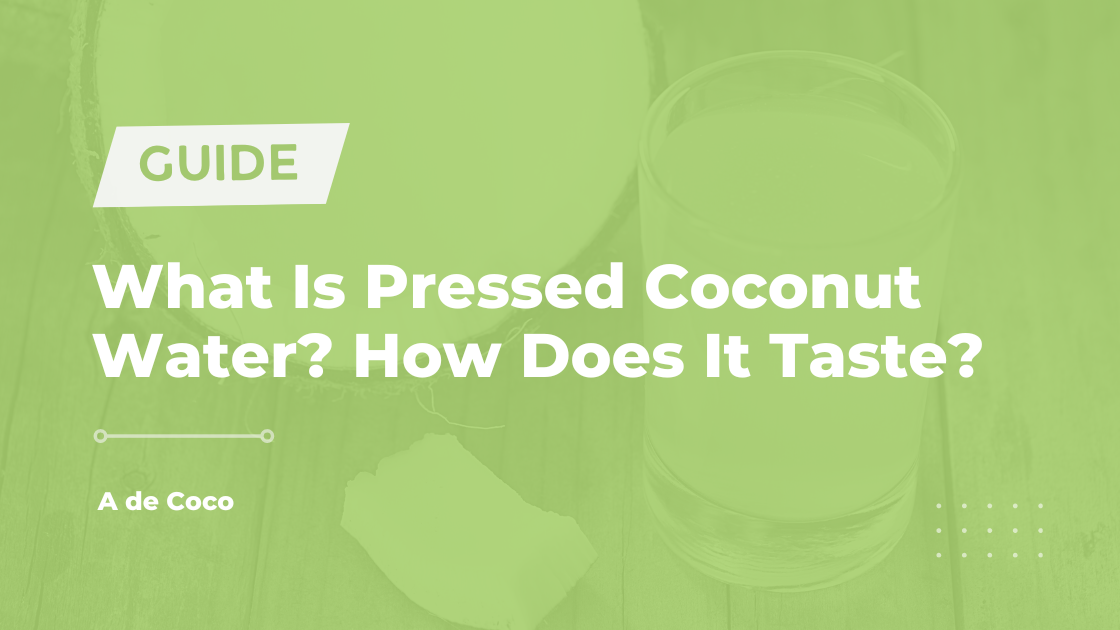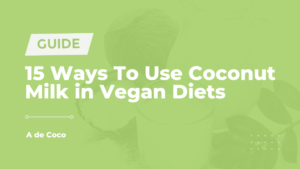Coconut water has gained worldwide recognition for its numerous health benefits.
However, the recent emergence of pressed coconut water has caught the attention of health enthusiasts and nutrition experts alike.
As a relatively new variant of traditional coconut water, it raises questions about its production process and resultant flavors.
This brings us to a crucial aspect, the distinctive taste of pressed coconut water.
The sensory experience it offers can be a deciding factor for many consumers.
Further on, we delve into the specifics of what pressed coconut water really is and how it distinguishes itself on the palate.
Contents
What Is Pressed Coconut Water? How Does It Taste?
Pressed coconut water is a beverage derived from the liquid inside young, green coconuts, extracted using high pressure processing which aids in preserving its nutrients and flavor. This process results in a refreshing, slightly sweet liquid that retains the natural taste of fresh coconuts. The flavor, often described as light, crisp, with a mildly nutty and sweet aftertaste, differs slightly among brands but is generally regarded as unique and refreshing.
It’s essential to delve deeper into the qualities of pressed coconut water, understanding its health benefits, production process, and its uses in culinary applications.
Despite its recent popularity, this natural beverage has a rich history that deserves to be fully explored.
Also, it’s compelling to compare it with regular coconut water, illuminating the differences and nuances that set them apart.
Embarking on this journey will provide you with a comprehensive understanding of this appealing and healthful refreshment.
Continue reading as we dive into these captivating aspects of pressed coconut water.
The Basics of Coconut Water
Coconut water is the clear liquid found inside immature coconuts.
As the coconut matures, some of the juice remains in liquid form while the rest ripens into the solid white flesh known as coconut meat.
Coconut water itself is a refreshing beverage that’s sweet, slightly salty, and packed with essential vitamins and minerals.
This in itself makes it a healthy drink option, but what makes pressed coconut water stand out?
Differentiating Pressed Coconut Water
The fact that it is pressed results in a much richer, creamier texture and an enhanced nutritional profile.
This process involves pressing the coconut meat with the water, resulting in a more full-bodied flavor and texture.
It offers all the goodness of regular coconut water, but with an added twist.
Now, it is worth noting that not every brand of coconut water uses this method.
The traditional way of producing coconut water is by merely extracting the liquid from inside a young coconut.
Benefits of Pressed Coconut Water
From a nutritional standpoint, pressed coconut water retains all the benefits of regular coconut water — such as being an excellent source of hydration, containing essential vitamins and minerals like potassium and vitamin C — and more.
The additional pulverizing process it goes through allows for the transfer of nutrients from the coconut meat into the water, taking its health benefits up a notch.
The added nutrients from the coconut meat, such as fiber and antioxidants, contribute to making pressed coconut water a slightly more robust health beverage than regular coconut water.
This essentially means that every sip of pressed coconut water is a step towards a healthier lifestyle.
Some studies have even suggested that regular consumption can aid in weight loss, improve skin health, and support good cardiovascular health.
Understanding what pressed coconut water is, and how it differs from regular coconut water, can help you make more informed decisions when it comes to choosing beverages.
Always remember that while the benefits of drinking this tropical treasure are plenty, it is crucial to consume it as part of a balanced and diverse diet.
The Production Process: How Is Pressed Coconut Water Made?
The process of producing pressed coconut water doesn’t take a lot of steps.
Compared to regular coconut water that commonly involved quite a few different processes, making pressed coconut water is more straightforward.
Gathering the Raw Material
The very first step in the production process is to harvest the coconuts.
These are typically green, fresh coconuts sourced from specific regions across the globe known for their tropical climate where coconuts thrive.
The harvesting process must be done meticulously to ensure that only the highest quality coconuts are used.
This strategy ensures that the final product will have the best taste, texture, and nutritional value.
The harvesting process must be done meticulously to ensure that only the highest quality coconuts are used.
Any unhealthy or overripe coconuts are discarded.
Extraction Process
Once the coconuts are harvested and sorted, they’re then ready for the water extraction process.
The coconuts are carefully opened, and the coconut water inside is collected – a delicate operation to make sure none of the precious liquid is lost.
The extraction should be done in a manner that prevents excessive heat.
Heat can potentially affect the flavour and nutritional profile of the coconut water.
So, the extraction should be done in a manner that prevents excessive heat.
After the coconut water is collected, it is quickly chilled and prepared for the pressing process.
The Pressing Process
The collected coconut water is then put through a high-pressure processing (HPP) system.
This process involves subjecting the coconut water to high levels of pressure, which helps to eliminate any unwanted bacteria and extend the product’s shelf life without using heat or added preservatives.
HPP helps to retain the natural flavour, colour, and nutritional value of the coconut water.
Utilizing the HPP method is what sets pressed coconut water production apart from the more traditional pasteurization methods used with regular coconut water.
The HPP helps to retain the natural flavour, colour, and nutritional value of the coconut water.
Ultimately, this makes the product more appealing and beneficial to consumers.
Final Product
After all of these steps, the final product is ready: fresh, pressed coconut water.
This coconut water has a unique taste profile that is different from regular coconut water.
It also has a nutritionally rich profile that has made it popular among health enthusiasts.
The final step is packaging the coconut water into bottles.
These are then shipped off to supermarkets or online stores around the world, ready for consumers to enjoy.
How Does Pressed Coconut Water Taste?
When it comes to understanding the sensory experience of consuming pressed coconut water, it’s important to note that its taste profile may differ greatly from that of the regular coconut water.
This discrepancy in taste can be largely attributed to the method of extraction used to produce the pressed variant.
Unlike regular coconut water – which is simply extracted from the interior of the coconut, pressed coconut water is comprised not only of the water found inside the coconut, but also of elements of the coconut meat itself.
The Flavor Profile of Pressed Coconut Water
Pressed coconut water possesses a distinctly richer, creamier taste when compared to regular coconut water.
This is because the pressing process transfers some of the flavors from the coconut’s flesh into the water.
Consequently, the water ends up having a creamy, slightly nutty flavor, which can be a pleasant surprise to some, and perhaps an acquired taste to others.
In support of this, people who have sampled pressed coconut water attest to its unique taste and generally note a hint of natural sweetness and a fuller body created by the inclusion of the coconut meat’s nutrients.
This interesting combination of flavors makes pressed coconut water a unique beverage – its taste is not easily compared to any other drink currently on the market.
How is the Texture of Pressed Coconut Water?
Apart from the distinctive taste, it should also be noted that the consistency of pressed coconut water is usually slightly thicker and more robust than regular coconut water.
This is again due to the presence of coconut pulp in the water.
This extra density provides a more satiating feel when consumed, making it a preferable option for those looking for a more filling beverage.
This texture, along with the naturally sweet, nutty flavor, can often lead to an enjoyable drinking experience that leaves consumers sated and satisfied, more so than might be achieved with regular coconut water alone.
Regular vs. Pressed Coconut Water
Coconut water, as a natural hydrating drink, has gained popularity over the years due to its impressive nutrient profile.
However, with the advent of pressed coconut water, many consumers ask: how does it differ from regular coconut water?
Extraction Process
The key difference mainly revolves around the extraction process.
Regular coconut water is typically derived from the liquid inside the coconut, harnessed by simply piercing and straining the coconut fruit.
Pressed coconut water, on the other hand, incorporates more of the coconut in its production process.
Instead of solely utilizing the inner liquid, it combines this with the pressed meat of the coconut.
Pressed coconut water, on the other hand, incorporates more of the coconut in its production process
This allows pressed coconut water to have a slightly thicker consistency and a more rounded flavor profile.
More importantly, it infuses the drink with more nutrients derived from the meat of the coconut.
Nutrient Content
Regular coconut water is known for being a high source of potassium and hydration.
It also contains a low calorie content which makes it a popular choice for fitness enthusiasts.
Pressed coconut water, however, takes this nutrient content a notch higher.
Aside from the benefits of regular coconut water, it also provides healthy fats, proteins, and fiber derived from the coconut meat.
Given its mixed content, pressed coconut water usually has a higher calorie content compared to regular coconut water.
This, however, is balanced by the added nutrients that it provides.
Given its mixed content, pressed coconut water usually has a higher calorie content compared to regular coconut water
This doesn’t diminish the health value of either drink, rather it simply broadens the options for consumers depending on their specific nutrient needs and taste preferences.
Flavor Profile
Regular coconut water carries a light, sweet, and slightly nutty flavor.
It is often likened to a tropical take on water, refreshing and light.
Pressed coconut water on the other hand offers a bolder version of this flavor.
Since it utilizes more of the coconut, its flavor profile is inherently more robust and full-bodied.
This gives it an edge to consumers who prefer a creamier, milk-like consistency in their drinks.
However, it might also be a downside for those who prefer the lightness of regular coconut water.
Are There Health Benefits to Drinking Pressed Coconut Water?
To understand the health benefits of drinking pressed coconut water, we must first examine its nutritional content.
Primarily, coconut water contains essential vitamins such as vitamin C, and minerals like potassium, calcium, and magnesium.
These electrolytes are vital for optimal body function and help to maintain fluid balance in the body.
Pressed coconut water tends has no added sugars or preservatives, making it a healthier choice than most store-bought beverages.
Cardiovascular Health
One of the critical benefits of consuming pressed coconut water is its positive impact on heart health.
Having high potassium content, it serves to balance out sodium levels in the body, thus reducing blood pressure and the risk of heart disease.
Moreover, it is low in calories and cholesterol and thus can be part of a heart-friendly diet.
Having high potassium content, it serves to balance out sodium levels in the body, thus reducing blood pressure and the risk of heart disease.
This is significant because cardiovascular diseases are today’s leading cause of death globally, and prevention methods such as a healthful diet are incredibly invaluable.
Hydration and Exercise Recovery
Another well-known benefit is hydration.
Due to its high electrolyte content, pressed coconut water is an excellent hydrating drink, especially beneficial after exercising or during illness.
Furthermore, it can effectively replace the electrolytes lost during physical activity, making it a potential natural alternative to sports beverages.
This ability to replenish electrolytes makes it a perfect post-workout drink, supporting rapid recovery and preventing dehydration.
Digestive Health
Pressed coconut water could also benefit the digestive system.
With its fibrous nature, this drink could facilitate better digestion and help prevent heartburn or indigestion.
Moreover, it can act as a gentle detoxifier, flushing harmful toxins out of the body and ensuring a healthier gut.
Diabetes Management
Recent studies suggest that pressed coconut water may help manage diabetes.
Its content of amino acids and electrolytes can aid in blood sugar regulation, potentially helping to control diabetes symptoms.
Moreover, it is a good source of dietary fibre, which slows sugar absorption, thereby preventing blood sugar spikes.
This means that in moderation and as part of a balanced diet, pressed coconut water can be a suitable and beneficial drink for individuals with diabetes.
Shelf-life of Pressed Coconut Water
Pressed coconut water, like other beverages, has a finite shelf life.
This makes it important to understand when and why the coconut water may go bad, and how you can prevent this.
Typically, unopened bottles or cans of pressed coconut water have a shelf life of 12 to 24 months.
The exact duration depends largely on the brand, storage conditions, and manufacturing processes.
The Role of Pasteurization
For instance, one factor that heavily dictates the shelf-life is whether the coconut water has been pasteurized or not.
Pasteurization is a process that uses heat to kill bacteria and microbes which could otherwise hasten spoiling.
If your pressed coconut water has been pasteurized, it will last significantly longer – easily up to 24 months without refrigeration.
That being said, it’s always beneficial to check the ‘best before’ date mentioned on the package.
Opened Pressed Coconut Water
On the other hand, the shelf-life of opened pressed coconut water is notably shorter.
After opening, you should ideally consume the beverage within 24 on the shelf to 48-72 hours in the refrigerator.
Preserving opened coconut water for longer can lead to a significant loss of flavor as well as potential bacterial contamination, regardless of refrigeration.
Occasionally, you might notice pressure build-up in the unopened cans or bottles of the coconut water.
This usually results from natural fermentation and doesn’t necessarily indicate spoilage.
Preserving opened coconut water for longer can lead to a significant loss of flavor as well as potential bacterial contamination, regardless of refrigeration.
By using unswerving measures and adhering to the right methods for storage, you can save your beverage from going off prematurely.
Telltale Signs of Spoiling
There are several telltale signs that your pressed coconut water has spoiled.
These include a sour or unusual odor, changed taste, discoloration, and the presence of mold.
Consuming spoiled coconut water can result in food poisoning.
Therefore, if you doubt the quality of your drink, it’s better to err on the side of caution and discard it.
Optimal Storage Conditions
The optimal conditions for storing your coconut water are a cool, shaded place away from temperature fluctuations.
After opening, store your beverage in the fridge and try to use it as soon as possible.
Maintaining these optimal conditions plays a significant role in preserving the quality and taste profile of the coconut water, and in preventing premature spoilage.
Your adherence to these storage instructions, along with the manufacturer’s directions, can effectively protect the freshness, flavor, and quality of the pressed coconut water.
Final Thoughts
Therefore, pressed coconut water is a unique, nutritious beverage that undergoes a specific production process to maintain its freshness and natural flavor.
It possesses a distinct taste that sets it apart from regular coconut water, and its nutritional values contribute to its categorization as a potential superfood.
Although the varying brands on the market may present diverse flavor profiles, the essence of its refreshing tropical taste remains constant.
Paired appropriately, it can enhance the delight of different meals.
However, its shelf-life is relatively short and precautions are needed for those who might be allergic.
This fascinating world of pressed coconut water offers an exciting exploration into a healthier lifestyle.




